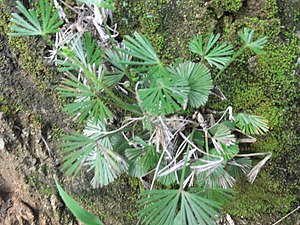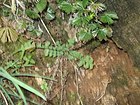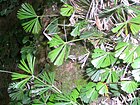Note: This is a project under development. The articles on this wiki are just being initiated and broadly incomplete. You can Help creating new pages.
Actiniopteris radiata
Actiniopteris radiata is a small fern growing upto 10 - 15cm tall from a short, creeping rhizome. The fronds have fan-shaped leaves. The plant is sometimes harvested from the wild for local medicinal use. It is often grown as an ornamental in gardens.
Contents
- 1 Uses
- 2 Parts Used
- 3 Chemical Composition
- 4 Common names
- 5 Properties
- 6 Habit
- 7 Identification
- 8 List of Ayurvedic medicine in which the herb is used
- 9 Where to get the saplings
- 10 Mode of Propagation
- 11 How to plant/cultivate
- 12 Commonly seen growing in areas
- 13 Photo Gallery
- 14 References
- 15 External Links
Uses
Fever, Heamorrhages, Bronchitis, Colic pain, Sprain, Injuries.[1]
Parts Used
Root.
Chemical Composition
It contains 37 compounds, out of 38, were identified with the combination of fatty acids, alkanes, triterpenoids and sterols. 9,12,15-octadecatrien-1-ol (18.7 %), Hexa decanoic acid (10.8 %), Hepatacosane (8.3 %), α-amyrin (7.0%), β-sitosterol (6.9 %) and n-Hexadecanoic acid (6.1 %) were the major contents in the wax.[2]
Common names
| Language | Common name |
|---|---|
| Kannada | Mayura shiki, Navilu juttu |
| Hindi | Moarfunki |
| Malayalam | |
| Tamil | Nanmugha pullu |
| Telugu | Mayura shiki |
| Marathi | |
| Gujarathi | |
| Punjabi | |
| Kashmiri | |
| Sanskrit | Mayura shiki |
| English | Picock's tail |
Properties
Reference: Dravya - Substance, Rasa - Taste, Guna - Qualities, Veerya - Potency, Vipaka - Post-digesion effect, Karma - Pharmacological activity, Prabhava - Therepeutics.
Dravya
Rasa
Guna
Veerya
Vipaka
Karma
Prabhava
Habit
Identification
Leaf
| Kind | Shape | Feature |
|---|---|---|
Flower
| Type | Size | Color and composition | Stamen | More information |
|---|---|---|---|---|
| Flowering season: September to February | {{{5}}} |
Fruit
| Type | Size | Mass | Appearance | Seeds | More information |
|---|---|---|---|---|---|
| Fruiting season: September to February |
Other features
List of Ayurvedic medicine in which the herb is used
Where to get the saplings
Mode of Propagation
How to plant/cultivate
A plant of drier areas in the tropics. Thrives at higher light levels and lower humidity than most ferns, preferring bright, filtered sunlight.[4]
Commonly seen growing in areas
Sunny or lightly shaded conditions in rock crevices, In shallow soil pockets overlaying sheet rock.
Photo Gallery
References
- ↑ Kappathagudda - A Repertoire of Medicinal Plants of Gadag, Page no: 41
- ↑ Journal of Essential oil and Bearing plants
- ↑ [Morphology]
- ↑ Cultivation details
External Links
- Ayurvedic Herbs known to be helpful to treat Fever
- Ayurvedic Herbs known to be helpful to treat Heamorrhages
- Ayurvedic Herbs known to be helpful to treat Bronchitis
- Ayurvedic Herbs known to be helpful to treat Colic pain
- Ayurvedic Herbs known to be helpful to treat Sprain
- Ayurvedic Herbs known to be helpful to treat Injuries
- Herbs with Root used in medicine
- Herbs with common name in Kannada
- Herbs with common name in Hindi
- Herbs with common name in Tamil
- Herbs with common name in Telugu
- Herbs with common name in Sanskrit
- Herbs with common name in English
- Habit - Fern
- Index of Plants which can be propagated by Spores
- Herbs that are commonly seen in the region of Sunny or lightly shaded conditions in rock crevices
- Herbs that are commonly seen in the region of In shallow soil pockets overlaying sheet rock
- Herbs
- Pages without herbs images





